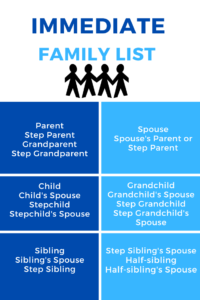
This year there are eight constitutional amendments on the November 8 ballot. Some are a bit complicated, and all require a little homework before you cast your vote. To assist, we’re breaking the list into bite-size chunks. Leading up to the start of early voting on October 25, we will highlight one amendment every few days to give you the background and context you need to understand what they do. And for lagniappe, we offer CABL’s recommendations on each of them.
Amendment #3 Allow Classified Civil Service Employees to Support Political Campaigns of Family Members
What It Does: Allows classified civil service employees at the state level, and in some municipalities, to support the campaign of “an immediate family member” in certain circumstances.
Background: Louisiana, like most states and the federal government, places some restrictions on what classified employees can do in terms of engaging in political activities. Classified employees are basically career civil servants who are not political appointees. They are part of a civil service system that affords them a number of job protections, but also places some restrictions on them – primarily in the area of involvement in politics.
Louisiana’s restrictions on political activity for classified employees are somewhat more robust than you see in most states and the federal government. That’s likely because of the state’s infamous experience with the “spoils system” and Huey Long’s “deduct box.” From the 1800s and through the 1930s, public employees were largely those who supported the winner in races for various elected offices. They got a job, sometimes more than one, but to stay employed they had to support the politician who got elected, both politically and financially.
In the years after Huey Long, a reform movement sought to end the spoils system. The Civil Service Commission was created in the early 1940s. It provided a number of protections for employees while outlawing political coercion from their bosses. In doing so, it also prohibited employees from involvement in political campaigns, fundraising, and contributing to people running for office. This was done primarily for their protection. The reasoning was that if the law clearly prohibits employees from engaging in political activities, it would be both difficult and risky for politicians to compel them to do it. Those restrictions remain embedded in the state constitution to this day.
 But this amendment seeks to create an exception to those longstanding rules. It would allow an “immediate family member” of a candidate for office to support them in their election by “attending campaign events and appearing in campaign advertisements and photographs.” This does not impact spouses who are already allowed to participate in various political activities.
But this amendment seeks to create an exception to those longstanding rules. It would allow an “immediate family member” of a candidate for office to support them in their election by “attending campaign events and appearing in campaign advertisements and photographs.” This does not impact spouses who are already allowed to participate in various political activities.
While the proposed change might seem relatively small to some, immediate family members in this case includes any of 21 different relatives. The amendment would allow these family members to attend fundraisers and other campaign events, appear in political advertisements, and dress in police or other uniforms without mentioning they are relatives. Those are fairly significant changes to rules that have been in place for decades.
Comment: Passage of this amendment would affect more than 51,000 employees who are under state Civil Service, New Orleans Civil Service, Plaquemines Parish Civil Service, Opelousas Civil Service, and Municipal Fire & Police Civil Service. It would not impact other local employees or the Louisiana State Police who have their own civil service systems.
Lawmakers who supported it were pretty clear that they did so because they were frustrated that their own family members who were classified civil service employees couldn’t publicly support them in their campaigns. This amendment is opposed by the Louisiana State Civil Service Commission, the Louisiana Civil Service League, and the civil service organizations in New Orleans, Plaquemines, and Opelousas.
Their concern is that the amendment opens a door that has been tightly closed for decades which keeps classified employees out of the political arena. The current constitutional restrictions are there, they say, for the protection of both the employees and the taxpayers.
It’s also not hard to notice that the term “immediate family member” is actually pretty large. Twenty-one different relatives is a lot and if you’re running for office in some jurisdictions, you could potentially be talking about a large part of a small town.
Finally, it is interesting to note, that while this amendment opens participation in political activities to a broad group of classified civil servants, it specifically excludes employees of the Registrars of Voters and the state Elections Division. If we don’t want them to get involved in politics, why would we want their colleagues in other agencies to be allowed to? That suggests there remains a good reason to keep our current laws in place.
CABL Recommendation: OPPOSE
